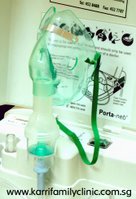 What is Asthma?
What is Asthma?First you need to understand the nature of asthma. It is a chronic disease like hypertension and diabetes. When you have asthma, the airways in your lungs are always sensitive and inflammed! If your child has eczema, you will understand what I mean. Just as the skin is sensitive, itchy and red in eczema, the airways are also inflammed and sensitive in asthma. So asthma is a disease that requires long term treatment rather then just a one off treatment like a cold.
What happens to the airways?
The airways become thicken and inflammed inside so the passsage where air can travel through narrows. This causes the wheeze which is very much the same way you whistle. The airways take awhile to become inflammed and will also take awhile to get back to normal. If you do not treat the airways, the long term inflammation will result in airways which are permenantly narrowed!
How do you recognize asthma?
Not all children who wheeze have asthma. Of the kids who have asthma, at least half will only have mild asthma. Here are some of the common signs that your child may have asthma:
- Wheezing, which can be brought on by triggers such as the haze, cold weather, dust and respiratory illnesses
- A cough that never seems to go away
- Coughing at night incessantly
- Shortness of breath
- Unable to run or do PE without getting tired and short of breath or wheezing
- Childhood eczema
- Parents have asthma
- Hospitalization during infancy for respiratory problems
Step 1: Intermittent
Wheezes less than once per week and night coughs happen less then twice a month.
Step 2: Mild Persistent
Wheezes more than once a week but less than once a day and night coughs more than twice a month
Step 3: Moderate Persistent
Wheezes daily has night coughs more than once per week
Step 4: Severe Persistent
Limited Physical activity and frequent night coughs
As a parent what you need to know is this:
- Does your child have asthma? If so, he needs to be treated
- Does your child have Step 2 Mild Persistent form of Asthma? If so, he needs to have long term preventive medication (we are talking 3 to 6 months of continuous medication)
In the meantime, if you think your child may have asthma, you can take the asthma test by clicking here

2 comments:
Hi Doctor
Where can I buy the Peak Flow Metrer from? Can you recommend a place where I can get it? Thanks
Regards,
Mrs Lim
You can probably buy it from hospital pharmacies.
Post a Comment